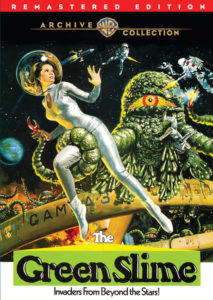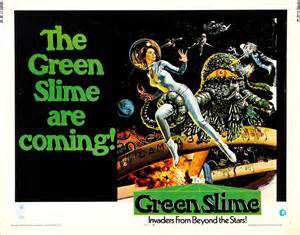The Green Slime
Screenplay: William Finger, Tom Rowe, Charles Sinclair
Minutes: 90
Year: 1968
Score: 6.00
Release: Warner Archive
Okay, I try to avoid linking to youtube videos but to be flippant, if this theme song doesn’t sell you on the movie, there is little more I can do to affect your opinion. From the Warner Archive Instant channel;
From WBShop.com
After a perilous mission to a huge asteroid, a crew returns to its space station, unaware that a bit of ooze from the asteroid clings to a crewman’s uniform. The green goop grows – into murderous, tentacled monsters. And as station members fight to live, gunk from the monsters’ wounds turns into more monsters! That’s the story. Now enjoy as our heroes fight to preserve Earth and, unintentionally, our own senses of humor with a movie that Kevin Thomas of the Los Angeles Times called “one of the funniest made-in-Japan sci-fi monster movies ever.” Kinji Fukasaku, whose later work was championed by Quentin Tarantino, directs. The world would be a far more bleak and joyless place without marvels like The Green Slime.
The Green Slime is not a technically good movie. Let’s put that forward early. It just isn’t. But, as long time readers know, that is not going to stop me  from loving the film. What we have is a mixture of a 1960s American Sci-fi flick with a post-nuclear Japanese kaiju monster movie. If you know this going in the you are going to be pleased.
from loving the film. What we have is a mixture of a 1960s American Sci-fi flick with a post-nuclear Japanese kaiju monster movie. If you know this going in the you are going to be pleased.
There isn’t too much depth to the movie so there is little that I can say beyond how gloriously cheesy the film is. I absolutely recommend the movie. More than this, though, is how much the film is indicative of pop culture. Two things, specifically, first is that it was written by Bill “DC Comics Legend and co-creator of Green Lantern” Finger. And two, it was also the pilot episode for Mystery Science Theater 3000.
Buy this, now. Or you can stream it here on Warner Archive Instant!
Director: 5 – Cinematography: 6 – Edit: 7 – Parity: 1 – Main performance: 6 – Else performance: 3 – Score: 9 – Sound: 4 – Story: 6 – Script: 5 – Effects: 9 – Design: 5 – Costumes: 7 – Keeps interest: 7 – Lasting: 10
